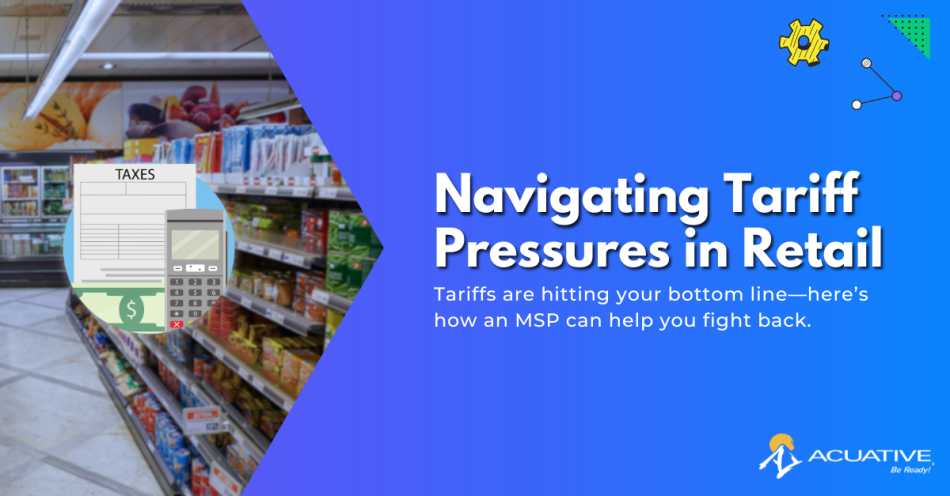Rich Ackerman
Retailers today are already balancing on a tightrope—juggling inflation, shifting consumer habits, and an increasingly complex global supply chain. Now, with the U.S. administration intensifying tariff policies on imported goods, particularly from China, Mexico, and Canada, new economic headwinds are forcing businesses to rethink their strategies. These tariffs are more than political headlines; they’re reshaping cost structures, squeezing margins, and putting technology investments under a microscope.
The Tariff Squeeze on Retailers
Tariffs drive up the cost of importing everything from apparel and electronics to key business technology components—point-of-sale (POS) systems, tablets, routers, switches, and surveillance equipment. For large-scale retail operations with hundreds or thousands of locations, even a 10–20% increase in hardware prices can translate into massive, unplanned expenses.
The impact doesn’t stop at higher prices. Supply chain delays have become more common as manufacturers adjust sourcing and production strategies to work around tariffs. These disruptions mean longer lead times for essential infrastructure and increased pressure to maintain seamless customer experiences and uptime across all locations.
In this economic environment, retailers are forced to make tough decisions: delay upgrades, cut costs elsewhere, or find new ways to get more value from their existing technology.

Why MSPs Matter More Than Ever
As retailers seek to adapt, many are turning to Managed Service Providers (MSPs) to help manage both the financial and operational strain. MSPs offer a way to stabilize IT costs, streamline deployments, and get the most out of every dollar spent.
1. Predictable Costs in an Unpredictable Economy
Retailers need to budget wisely—and MSPs offer fixed monthly pricing that helps avoid surprise costs. This is especially valuable when hardware costs are volatile or lead times are uncertain.
2. Strategic Procurement and Vendor Relationships
MSPs often have strong relationships with hardware vendors and distributors, allowing them to source equipment more efficiently, find cost-effective alternatives, and sometimes secure better pricing than retailers could on their own.
3. Lifecycle Management and Asset Optimization
When budgets are tight, MSPs can help retailers extend the life of existing infrastructure through proactive maintenance, remote monitoring, and firmware updates—delaying the need for costly replacements.
4. National Rollouts and Remote Support
For retail chains, scaling IT deployments across locations is a major challenge. MSPs bring the project management, logistics, and on-the-ground field services needed to streamline these efforts, even when supply chains are disrupted.
5. Less Downtime, More Uptime
Downtime in retail isn’t just inconvenient—it’s expensive. MSPs provide 24/7 monitoring and rapid response support, keeping critical systems online even when resources are stretched.
While some retailers may consider relying solely on internal IT departments, the current tariff environment exposes a key vulnerability: in-house teams can’t shield businesses from the rising costs of hardware and infrastructure. With tariffs driving up the price of imported tech components, internal IT budgets are being stretched thin. MSPs, by contrast, can leverage vendor relationships and buying power to source equipment more cost-effectively—helping clients absorb some of the financial shock. They also offer broader expertise, 24/7 support, and the flexibility to scale services up or down as needed—without the burden of hiring, training, and retaining a large IT workforce. In short, MSPs are not just a cost alternative—they're a strategic buffer in an inflationary, tariff-driven market.
The Bottom Line
Tariffs may not have been designed to disrupt the retail tech landscape, but they’ve certainly done so. In response, retailers are increasingly turning to MSPs not just to survive—but to stay agile, reduce costs, and future-proof their operations.
As hardware costs fluctuate and economic pressures grow, the value of a strategic MSP partner becomes clearer: it’s not just about fixing problems—it’s about navigating uncertainty with confidence.
How Acuative Can Help
Acuative specializes in helping retailers thrive during economic turbulence. From strategic procurement and nationwide rollouts to 24/7 network monitoring and field support, our team acts as an extension of yours—ensuring you stay connected, secure, and operational across all locations. We understand the unique pressures retailers face, and we tailor our managed services to meet your business goals while helping you adapt to market changes, mitigate risk, and maintain predictable IT costs.
Contact us now to learn more.
 About Rich Ackerman
About Rich Ackerman
Rich is a co-founder of Acuative and has over 30 years of experience in voice and data communications working with large enterprises and service providers.
Rich's experience gives him the ability to tackle complex opportunities that require collaboration with other organizations to develop innovative and responsive solutions.

